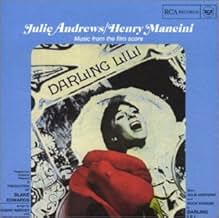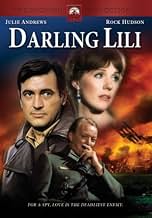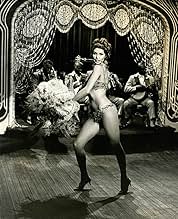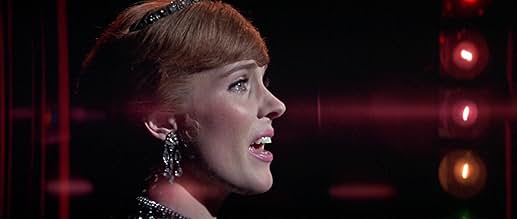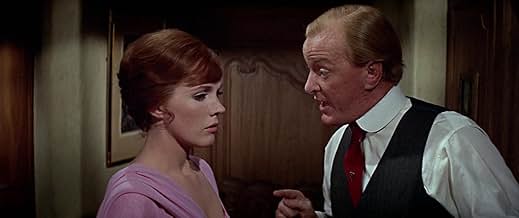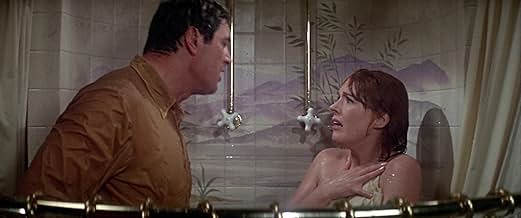Darling Lili
- 1970
- Tous publics
- 2h 16m
IMDb RATING
6.0/10
2.6K
YOUR RATING
Set during World War I, this movie is a cute spin on the Mata Hari legend.Set during World War I, this movie is a cute spin on the Mata Hari legend.Set during World War I, this movie is a cute spin on the Mata Hari legend.
- Director
- Writers
- Stars
- Nominated for 3 Oscars
- 1 win & 7 nominations total
Arthur Gould-Porter
- Sergeant Wells
- (as A.E. Gould-Porter)
David Armstrong
- Squadron Pilot
- (uncredited)
Yves Barsacq
- French General
- (uncredited)
- Director
- Writers
- All cast & crew
- Production, box office & more at IMDbPro
Featured reviews
It was 1970. Julie Andrews had hit her highs onscreen, and her star was starting to fade, at least in the public's eye. "Lili" represented another opportunity for Julie to change her image, coming right after the megamusical "STAR!" which didn't deserve the drubbing *it* received either.
Audiences didn't seem to care for this WWI musical drama. In fact, they were staying away in droves from ANY musical--drama or not.
The shame of it all is that this film, with its many classic moments, was stigmatized by the press who were gunning for Our Fair Julie and her new beau, writer/director/producer Blake Edwards.
But "Lili" really *is* worth seeking out. Julie sings beautifully, especially the haunting "Whistling Away the Dark," a lovely Henri Mancini tune that opens and closes the film. Her performance is nuanced and quite affecting--just watch her as a fat tear silently slides down her cheek after a tumultuous argument with Major Larabee.
Edwards has staged some stunning flight sequences, but the suffer somewhat, in 1990s sensibilities, from the blue-screen process shots needed to get Rock "into" midair. Edwards also can't seem to help himself from sliding into formulaic comedy bits (he apparently thinks a bumbling Frenchman with an umbrella on a roof in a rainstorm is hilarious--it shows up in film after film of his).
The reason to watch "Lili" is for its interesting spin on the Mata Hari legend and the performance of Miss Andrews, who certainly didn't deserve the brickbats that came her way following its release.
Audiences didn't seem to care for this WWI musical drama. In fact, they were staying away in droves from ANY musical--drama or not.
The shame of it all is that this film, with its many classic moments, was stigmatized by the press who were gunning for Our Fair Julie and her new beau, writer/director/producer Blake Edwards.
But "Lili" really *is* worth seeking out. Julie sings beautifully, especially the haunting "Whistling Away the Dark," a lovely Henri Mancini tune that opens and closes the film. Her performance is nuanced and quite affecting--just watch her as a fat tear silently slides down her cheek after a tumultuous argument with Major Larabee.
Edwards has staged some stunning flight sequences, but the suffer somewhat, in 1990s sensibilities, from the blue-screen process shots needed to get Rock "into" midair. Edwards also can't seem to help himself from sliding into formulaic comedy bits (he apparently thinks a bumbling Frenchman with an umbrella on a roof in a rainstorm is hilarious--it shows up in film after film of his).
The reason to watch "Lili" is for its interesting spin on the Mata Hari legend and the performance of Miss Andrews, who certainly didn't deserve the brickbats that came her way following its release.
In an odd, comic take on Mata Hari's legendary fame, Julie Andrews stars as a well-loved British entertainer who seduces military leaders and passes on their secrets to the Germans. This movie doesn't take itself too seriously, so feel free to just tap your toe and enjoy Julie's fun musical numbers. It's also a Blake Edwards movie, so you can expect to be entertained by quick comedy and superb comic timing. In a famous scene, Rock Hudson gets so mad, he barges in on Julie Andrews in the shower to continue their argument.
In one of my favorite scenes, Julie has been tasked with delaying Rock at her house. She puts on a large act of seduction, but in order to stretch things out, she insists on getting literally swept off her feet. Rock struggles to pick her up and carry her through the rooms, since she continues to kiss him and pretends to be so engrossed in her task she doesn't know he's having trouble. It's pretty funny, as is much of the movie. The very best scene, though, is hands down the striptease. Julie gets jealous of Rock's other paramour Gloria Paul. Gloria's a stripper, and Julie watches a risqué dance, then recreates it onstage in her next performance! You won't be able to believe it until you see it: Julie Andrews bumping, grinding, and taking her dress off. I thought it was fantastic, and it almost earned her a Hot Toasty Rag nomination; but there were lots of heavy, dramatic performances that year and she didn't make it on the list.
You'll get to hear lots of fun songs that put you back in the wartime mood, and Henry Mancini's Oscar- and Rag-nominated "Whistling in the Dark" opens the film. And with two pretty people in the leads, and lots of smooching, you're in for an enjoyable, funny evening.
In one of my favorite scenes, Julie has been tasked with delaying Rock at her house. She puts on a large act of seduction, but in order to stretch things out, she insists on getting literally swept off her feet. Rock struggles to pick her up and carry her through the rooms, since she continues to kiss him and pretends to be so engrossed in her task she doesn't know he's having trouble. It's pretty funny, as is much of the movie. The very best scene, though, is hands down the striptease. Julie gets jealous of Rock's other paramour Gloria Paul. Gloria's a stripper, and Julie watches a risqué dance, then recreates it onstage in her next performance! You won't be able to believe it until you see it: Julie Andrews bumping, grinding, and taking her dress off. I thought it was fantastic, and it almost earned her a Hot Toasty Rag nomination; but there were lots of heavy, dramatic performances that year and she didn't make it on the list.
You'll get to hear lots of fun songs that put you back in the wartime mood, and Henry Mancini's Oscar- and Rag-nominated "Whistling in the Dark" opens the film. And with two pretty people in the leads, and lots of smooching, you're in for an enjoyable, funny evening.
After 35 years, I've seen this film again; the 136 minute version at the Anthology Film Archives in New York City's East Village. They also showed the 114 minute version which, according to their production notes, is darker in tone, since it's missing some of the comedy of the piece. Certainly some of the cutesy comedy, which Blake Edwards, the director/producer/writer, also seems to be enamored of in his Pink Panther movies, could be cut.
The film is an attempt to make a mature, romantic musical and was a big flop at the time. Edwards was married to Julie Andrews, the female star of the movie. Andrews had a great success with "Mary Poppins" a few years earlier, and a phenomenal success with "The Sound of Music." She tried repeating the success with the awful (but, perhaps, commercially successful) "Thoroughly Modern Millie," and had a stinker with "Star!", the Gertrude Lawrence story. "Star!" was an adult musical, but it didn't take, so "Darling Lili" was another try at breaking Andrews' goody-two-shoes image. She says "ass" in the movie twice and "bastard" once! The scenes I remember most from the first screening in 1970 are the striptease by Suzette (Gloria Paul) and the aerial sequences, which are pretty dazzling (except for the obvious process shots). In fact, the whole movie is quite lavish and Andrews is gowned and bejeweled beautifully. Edwards seems to have studied the films of Vincente Minnelli and is better at creating some of the Minnellian tone than George Cukor was with the dull "My Fair Lady." In fact, Minnelli was making a movie - "On A Clear Day..." - at Paramount the same time "Darling Lili" was being produced. "...Lili" went into major cost overruns, which could account for "...Clear Day..." being so lackluster in its modern scenes, since major money was being pumped into the Andrews/Edwards film.
The movie isn't terrible. In fact, it's quite charming, if a little long. But the movie-going public is fickle, and Julie Andrews musicals fell quickly out of favor. Rock Hudson is enormously likable as always, but has little to do. The production design is delightful, and it's fun to see Andrews do her striptease (which may not be in the shorter version, and I'm thinking that must have been the version I saw in 1970, because I think I would have remembered it).
Maybe the movie will come out on DVD now that they are showing two versions in NYC. The print was beautiful, by the way. It even included the overture. The audience was a poignant collection of solitary film nerds, not excluding myself!
The film is an attempt to make a mature, romantic musical and was a big flop at the time. Edwards was married to Julie Andrews, the female star of the movie. Andrews had a great success with "Mary Poppins" a few years earlier, and a phenomenal success with "The Sound of Music." She tried repeating the success with the awful (but, perhaps, commercially successful) "Thoroughly Modern Millie," and had a stinker with "Star!", the Gertrude Lawrence story. "Star!" was an adult musical, but it didn't take, so "Darling Lili" was another try at breaking Andrews' goody-two-shoes image. She says "ass" in the movie twice and "bastard" once! The scenes I remember most from the first screening in 1970 are the striptease by Suzette (Gloria Paul) and the aerial sequences, which are pretty dazzling (except for the obvious process shots). In fact, the whole movie is quite lavish and Andrews is gowned and bejeweled beautifully. Edwards seems to have studied the films of Vincente Minnelli and is better at creating some of the Minnellian tone than George Cukor was with the dull "My Fair Lady." In fact, Minnelli was making a movie - "On A Clear Day..." - at Paramount the same time "Darling Lili" was being produced. "...Lili" went into major cost overruns, which could account for "...Clear Day..." being so lackluster in its modern scenes, since major money was being pumped into the Andrews/Edwards film.
The movie isn't terrible. In fact, it's quite charming, if a little long. But the movie-going public is fickle, and Julie Andrews musicals fell quickly out of favor. Rock Hudson is enormously likable as always, but has little to do. The production design is delightful, and it's fun to see Andrews do her striptease (which may not be in the shorter version, and I'm thinking that must have been the version I saw in 1970, because I think I would have remembered it).
Maybe the movie will come out on DVD now that they are showing two versions in NYC. The print was beautiful, by the way. It even included the overture. The audience was a poignant collection of solitary film nerds, not excluding myself!
Recognized with three Oscar nominations Darling Lili was a big flop at the time and helped seal the fate of big budget musicals and Julie Andrews's career in them. They were getting just too expensive to make with all the talent that used to be under contract to a studio now charging full market value for services. Whatever else Darling Lili is it's a full market value musical film.
Set in the era of World War I, Darling Lili's best asset is its music. Two of the three nominations were in the music field for best overall score and to Henry Mancini and Johnny Mercer for the song Whistling In The Dark. That one is an incredibly beautiful number that Julie Andrews sings perfectly. The original songs are integrated so well into the film that they fit perfectly in the era. More traditional World War I era songs are also used, no doubt all in the public domain by 1970.
Would that the score was attached to a better story. Wholesome Julie Andrews is a popular entertainer of the era, singing for the troops on the western front. She also doubles as a German spy. Her assignment which she accepts with gusto is to get involved with American air ace Rock Hudson and learn some military secrets. I think you can guess the rest.
Darling Lili lurches back and forth from cloak and dagger espionage to slapstick comedy in the extreme and it's an uncomfortable ride in the process. One of the characters is Lance Percival playing a drunken pilot in the Royal Flying Corps. I mean really, this guy should never have been in the RFC, the comedy which is good is severely out of place.
Film buffs will recognize some similarity to The Firefly and the British classic Dark Journey so if you know those films you know how this one ends. Fans of Rock Hudson and of Julie Andrews will like this and her singing is divine. The rest of Darling Lili is on a lesser plain.
Set in the era of World War I, Darling Lili's best asset is its music. Two of the three nominations were in the music field for best overall score and to Henry Mancini and Johnny Mercer for the song Whistling In The Dark. That one is an incredibly beautiful number that Julie Andrews sings perfectly. The original songs are integrated so well into the film that they fit perfectly in the era. More traditional World War I era songs are also used, no doubt all in the public domain by 1970.
Would that the score was attached to a better story. Wholesome Julie Andrews is a popular entertainer of the era, singing for the troops on the western front. She also doubles as a German spy. Her assignment which she accepts with gusto is to get involved with American air ace Rock Hudson and learn some military secrets. I think you can guess the rest.
Darling Lili lurches back and forth from cloak and dagger espionage to slapstick comedy in the extreme and it's an uncomfortable ride in the process. One of the characters is Lance Percival playing a drunken pilot in the Royal Flying Corps. I mean really, this guy should never have been in the RFC, the comedy which is good is severely out of place.
Film buffs will recognize some similarity to The Firefly and the British classic Dark Journey so if you know those films you know how this one ends. Fans of Rock Hudson and of Julie Andrews will like this and her singing is divine. The rest of Darling Lili is on a lesser plain.
I suppose I like this film as well as any I know; it is not perfect, but under the title "The Americanization of Lily" this charming and memorable semi-musical satire might I suggest have been appreciated more, and still loved by those who recognized its special Blake Edwards'-produced spirit of gentleness, clever humor and solid narrative. The improbably but delightful story-line follows Lili Smith, a fringe-type spy for the Germans in a much simpler and less black-and-white war; Lili Schmidt passing as Smith is helping her Uncle who is patriotic too, for Germany but neither cruel nor political, merely opportunistic. Lili's target is William Larrabee, a charismatic U.S. squadron leader who can supply her valuable information. The plot thickens comes when Lili falls in love with Larrabee, has her eyes opened to the consequences of her playing spy, and sees the effects of combat on wounded men at a hospital and realizes what it might mean to his men whom she has met and likes. She gets jealous of a rival for Larrabee's affections, then realizes she can no longer do what she has been doing and gives up the spy business. The logical end of the film comes when after the terrible WWI has ended, as she sings the theme song of the film, "Wishing" in a darkened theater, one by one the members of Larrabee's squadron appear, including her lover himself, indicating they have forgiven her and their former opponents; and even Uncle Kurt enthusiastically joins in the singing of "It's a Long To Tipperraree", to indicate all is well with the world again. This is an audacious and sometime brilliant story idea, written by director Blake Edwards and William Peter Blatty of "John Goldfarb" fame; and it is a delightful narrative. Larrabee's squadron, including an inebriate who keeps crashing and other lovable types populate this lively film; and the feel of this stylish and glowing film is almost epic, both in its scope and realization. Credit must go to Jack Bear and Donald Brooks for their costume creations, Reg Allen and Jack Stevens for sets, Fernando Carrere for another beautiful production design, Henry Mancini for his sensitive and appropriate musical score, and to Russell Harlan for his shining cinematography. In the beautiful footage, the principal actors are Julie Andrews as Lili, Rock Hudson as Larrabee, Keremy Kemp outstanding as Lili's Uncle Kurt, Michael Witney, Lance Percival as the inebriate pilot, gorgeous Gloria Paul as Lili's stripteasing rival, and many other fine actors in smaller parts. It is hard to say enough nice things about the pace, or the cleverness of the just-this-side-of broad comedy; this element is introduced by Edwards to leaven the horrors of actual warfare, to example the almost comic-opera approach with which men made war back in a more innocent-minded era of human civilization.. This comedy also helps prepare the way for Lili's conversion from uncritical acceptance of a duty to the German state to acceptance of the reality of what she is doing and potentially what she may be causing. This is a rare "sense-of-life" film about Lili's "Americanization", her assertion of herself in the real world and then among others before tragedy can happen. It is haunting, I find, and beautiful in many ways. I consider it to be Blake Edwards'masterpiece of directing; and under the title "The Americanization of Lili" I believe with hardly any changes it might have been recognized as the polished sapphire of a film it is by every standard I know.
Did you know
- TriviaA very troubled production, this movie went way over budget and was a box-office flop when released. Director Blake Edwards used the experience of making this movie as the inspiration for the script to S.O.B. (1981).
- GoofsIn the "Cafe Can Can" scene the World War I American pilots are said to belong to an "Eagle Squadron" but that term was only used for Americans flying with the RAF in World War II.
- Quotes
Lili Smith: But then, why *does* he drink?
Maj. William Larrabee: Because he's afraid to fly.
Lili Smith: Then why does he fly?
Maj. William Larrabee: Because he likes to drink!
- Crazy creditsThe Paramount Pictures logo does not appear in the beginning of the film, only at the end of the film.
- Alternate versionsTwo decades after its original release, director Blake Edwards re-cut the film for the TNT network, shortening it by 22 minutes and dramatically changing its tone. This so-called "director's cut" runs 114 minutes.
- ConnectionsFeatured in Entertainment This Week Salutes Paramount's 75th Anniversary (1987)
- SoundtracksLa Marseillaise
by Claude Joseph Rouget de Lisle
Special French Lyrics Translations by Danielle Mauroy and Michel Legrand
- How long is Darling Lili?Powered by Alexa
Details
- Release date
- Country of origin
- Languages
- Also known as
- Darling Lili: Or Where Were You the Night You Said You Shot Down Baron von Richtofen
- Filming locations
- Production company
- See more company credits at IMDbPro
Box office
- Budget
- $25,000,000 (estimated)
- Runtime2 hours 16 minutes
- Aspect ratio
- 2.35 : 1
Contribute to this page
Suggest an edit or add missing content



